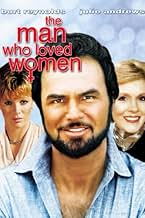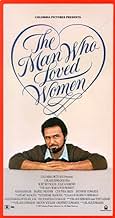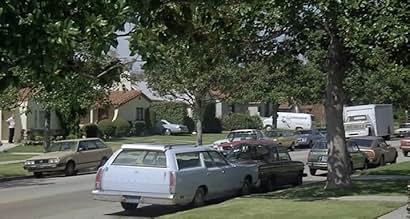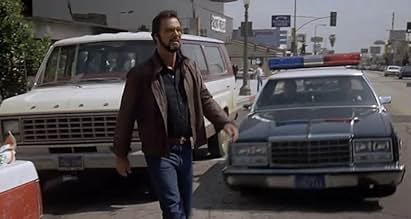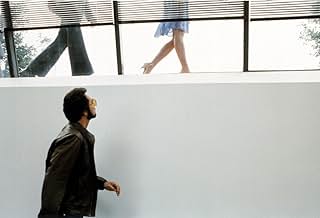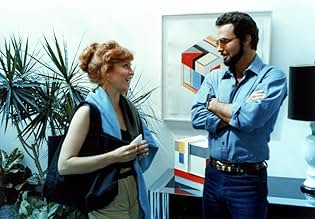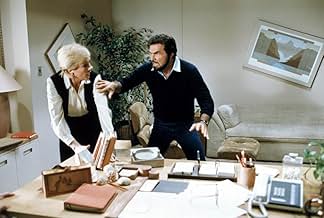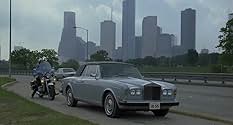CALIFICACIÓN DE IMDb
5.3/10
2.7 k
TU CALIFICACIÓN
Agrega una trama en tu idiomaA womanizing sculptor named David goes to seek help from a psychiatrist, Marianna, to cure him of his obsession with women.A womanizing sculptor named David goes to seek help from a psychiatrist, Marianna, to cure him of his obsession with women.A womanizing sculptor named David goes to seek help from a psychiatrist, Marianna, to cure him of his obsession with women.
- Dirección
- Guionistas
- Elenco
Cynthia Sikes Yorkin
- Courtney
- (as Cynthia Sikes)
Herb Tanney
- Doctor
- (as Schweitzer Tanney)
Opiniones destacadas
In the climactic moment of one of the great film scripts of all time, "The Verdict" by David Mamet, attorney Edward Concannon (James Mason) implores the judge, "We can't be expected to accept a (photo)copy when we have the original."
Many consider Truffaut's 1977 "L'homme qui aimait les femmes" a wonderful film. Anyone who has seen this original, need not venture to this 1983 remake, the land of Blake Edwards, his family and his friends.
This film likely falls under the category of 'the studio still needs another film from me (Edwards) and I have not a single inspired idea'.
Don't get me wrong. I'm an avid fan of Edwards, and consider many of his films (notably Days of Wine and Roses, Breakfast at Tiffanys, S.O.B., and Operation Petticoat to ALL be amongst my favorites. Of course the Pink Panther series is a masterpiece in and of itself.
But this film is weak, and uninspired, laden with narrative-I've never really figured who came up with the idea of opening a 'comedy' with the main character's funeral, and an accompanying heart-wrenching eulogy from one of his lovers.
Don't accept a copy when the original is available.
Many consider Truffaut's 1977 "L'homme qui aimait les femmes" a wonderful film. Anyone who has seen this original, need not venture to this 1983 remake, the land of Blake Edwards, his family and his friends.
This film likely falls under the category of 'the studio still needs another film from me (Edwards) and I have not a single inspired idea'.
Don't get me wrong. I'm an avid fan of Edwards, and consider many of his films (notably Days of Wine and Roses, Breakfast at Tiffanys, S.O.B., and Operation Petticoat to ALL be amongst my favorites. Of course the Pink Panther series is a masterpiece in and of itself.
But this film is weak, and uninspired, laden with narrative-I've never really figured who came up with the idea of opening a 'comedy' with the main character's funeral, and an accompanying heart-wrenching eulogy from one of his lovers.
Don't accept a copy when the original is available.
Here is a picture that, for every conceivable reason, shouldn't work -- but on a purely emotional level, it does. Most viewers could be easily misled (and disappointed) by expecting a light romantic comedy or a wild sex farce. Instead, Blake Edwards and his co-screenwriters offer something entirely different, a picture far more complex, meaningful, and thought-provoking than what we might anticipate.
"The Man Who Loved Women" tells a sad, sad story about a middle-aged man (Burt Reynolds in one of his finest performances, as David Fowler) who drowns in isolation thanks to a rare ability: he's forced and driven, by instinct, to glimpse the sacredness and inner beauty of almost every woman he encounters. Yes, on some levels, his circumstances lead to a hedonistic paradise. But his feelings also prevent him from ever making a commitment, and isolate him from the joy of knowing one woman exclusively.
For that reason, a melancholic canopy hangs over the entire film and takes the front seat to humour. The story begins with David Fowler's death, and every event we witness onscreen is tinged by our knowledge that Fowler's obsession with women will eventually kill him. A slow, heavy, stringed theme song, Mancini's "Little Boys", plays softly throughout the film, and Fowler's words (in voice-over narration) constantly remind us of the deep, incurable loneliness that plagues him.
All of this might sound heavy-handed -- and it very well could be, if it weren't for the sexual fantasy and wild Edwards comedy that flesh out the story and provide relief. The melancholia and comedy work together, and Edwards achieves a delicate balance of mood --a bittersweet aura.
I've heard one criticism (see Ebert's review) that many of the story's psychological elements are impossible. Though a few scenes might suffer from exaggeration (hundreds and HUNDREDS of women attend David's funeral), one could easily dismiss the story -- as I did, at first --because so many male viewers *lack* Fowler's ability to care for women unconditionally; we want to believe that it's impossible for a contemporary Don Juan to exist. But that simply isn't tenable. My own theory about the film -- (and it's just a theory) -- is that Edwards may have pulled inspiration for Fowler from the late John Derek, another man worshipped and adored by women, who interacted with Edwards during the filming of "10" (1979).
Edwards and his co-writers lend a gentle touch to the film by crafting Fowler's character against-the-grain; while we might expect a narcissistic hedonist, he's just the opposite -- a warm, gentle, soul with only the sincerest motives. It's easy to understand why women are attracted to Fowler, from his first appearance onscreen. And, oddly -- male viewers may never begrudge Fowler his affairs, only applaud -- because his narration and his gentle spirit confirm the fact that he really does worship and adore everything about the girls who walk in and out of his life. "I keep thinking," he says sadly, "about all the women I'm never gonna know..."
In one of the film's most revealing and effective moments, Edwards allows us to glimpse a woman, at the funeral, who is the complete opposite of a "10" -- fat, homely, depressed -- undesirable. We have the distinct impression that her external appearance didn't matter to Fowler -- that he only looked into her heart and perceived her beauty. It lends credibility to psychologist Marianna's (Julie Andrews) observation: that David did, indeed, love all of the girls, equally and unconditionally.
"The Man Who Loved Women" tells a sad, sad story about a middle-aged man (Burt Reynolds in one of his finest performances, as David Fowler) who drowns in isolation thanks to a rare ability: he's forced and driven, by instinct, to glimpse the sacredness and inner beauty of almost every woman he encounters. Yes, on some levels, his circumstances lead to a hedonistic paradise. But his feelings also prevent him from ever making a commitment, and isolate him from the joy of knowing one woman exclusively.
For that reason, a melancholic canopy hangs over the entire film and takes the front seat to humour. The story begins with David Fowler's death, and every event we witness onscreen is tinged by our knowledge that Fowler's obsession with women will eventually kill him. A slow, heavy, stringed theme song, Mancini's "Little Boys", plays softly throughout the film, and Fowler's words (in voice-over narration) constantly remind us of the deep, incurable loneliness that plagues him.
All of this might sound heavy-handed -- and it very well could be, if it weren't for the sexual fantasy and wild Edwards comedy that flesh out the story and provide relief. The melancholia and comedy work together, and Edwards achieves a delicate balance of mood --a bittersweet aura.
I've heard one criticism (see Ebert's review) that many of the story's psychological elements are impossible. Though a few scenes might suffer from exaggeration (hundreds and HUNDREDS of women attend David's funeral), one could easily dismiss the story -- as I did, at first --because so many male viewers *lack* Fowler's ability to care for women unconditionally; we want to believe that it's impossible for a contemporary Don Juan to exist. But that simply isn't tenable. My own theory about the film -- (and it's just a theory) -- is that Edwards may have pulled inspiration for Fowler from the late John Derek, another man worshipped and adored by women, who interacted with Edwards during the filming of "10" (1979).
Edwards and his co-writers lend a gentle touch to the film by crafting Fowler's character against-the-grain; while we might expect a narcissistic hedonist, he's just the opposite -- a warm, gentle, soul with only the sincerest motives. It's easy to understand why women are attracted to Fowler, from his first appearance onscreen. And, oddly -- male viewers may never begrudge Fowler his affairs, only applaud -- because his narration and his gentle spirit confirm the fact that he really does worship and adore everything about the girls who walk in and out of his life. "I keep thinking," he says sadly, "about all the women I'm never gonna know..."
In one of the film's most revealing and effective moments, Edwards allows us to glimpse a woman, at the funeral, who is the complete opposite of a "10" -- fat, homely, depressed -- undesirable. We have the distinct impression that her external appearance didn't matter to Fowler -- that he only looked into her heart and perceived her beauty. It lends credibility to psychologist Marianna's (Julie Andrews) observation: that David did, indeed, love all of the girls, equally and unconditionally.
The title of 1983's "The Man Who Loved Women" tells you everything you need to know: Burt Reynolds plays David Fowler, a man who sees the beauty in practically every woman and therefore can never settle down with one. As such, he ends up isolated and on the couch of a therapist, Marianna (Julie Andrews). The entire movie consists of Marianna trying to figure David out and help him while the latter relays several of his amorous connections in flashback. When the therapy is over will THEY start a relationship? Fowler's many women include Kim Basinger, Marilu Henner and Denise Crosby.
I encourage you to read Nsouthern51's review from April 25, 2001, on IMDb because it expertly interprets and evaluates the movie. While the film could be considered a romantic comedy it's also a tragic study of a Romeo and therefore there's a pall of melancholy despite the light tone and amusing elements, including black comedy. Speaking of which, while I don't think adultery's something to take lightly and therefore don't find it very amusing, it ties into Fowler's folly and blindness due to his weakness, women.
The good thing is that Fowler's not all bad or unlikable (Burt is his typical amiable self in an atypical role). He's not the conventional lothario who uses and abuses; he genuinely loves women and is fascinated by them. He loves them so much he can't bear to be with just one because that would mean he'd never know hundreds or thousands of others, but then he aches because he doesn't want to hurt the women he leaves.
The best part is Fowler's salvation of a new-to-the-trade prostitute whom he ends up hiring for his sculpting business. He nobly resists acting on his carnal instincts and therefore sacrifices for her good. The girl is played by a pre-Star Trek (TNG) Denise Crosby and she looks great.
At the end of the day the movie features Reynolds in an unusual role, which might turn off fans, and the strange mix of melancholy and amusement may turn-off others. It's not great, but it's good enough for what it is and therefore worthwhile. It's similar to Altman's "Dr. T and the Women" (2000) so if you don't like that movie you probably won't like this one.
The film runs 110 minutes and was shot in Houston, Texas, and Los Angeles, CA.
GRADE: B-
I encourage you to read Nsouthern51's review from April 25, 2001, on IMDb because it expertly interprets and evaluates the movie. While the film could be considered a romantic comedy it's also a tragic study of a Romeo and therefore there's a pall of melancholy despite the light tone and amusing elements, including black comedy. Speaking of which, while I don't think adultery's something to take lightly and therefore don't find it very amusing, it ties into Fowler's folly and blindness due to his weakness, women.
The good thing is that Fowler's not all bad or unlikable (Burt is his typical amiable self in an atypical role). He's not the conventional lothario who uses and abuses; he genuinely loves women and is fascinated by them. He loves them so much he can't bear to be with just one because that would mean he'd never know hundreds or thousands of others, but then he aches because he doesn't want to hurt the women he leaves.
The best part is Fowler's salvation of a new-to-the-trade prostitute whom he ends up hiring for his sculpting business. He nobly resists acting on his carnal instincts and therefore sacrifices for her good. The girl is played by a pre-Star Trek (TNG) Denise Crosby and she looks great.
At the end of the day the movie features Reynolds in an unusual role, which might turn off fans, and the strange mix of melancholy and amusement may turn-off others. It's not great, but it's good enough for what it is and therefore worthwhile. It's similar to Altman's "Dr. T and the Women" (2000) so if you don't like that movie you probably won't like this one.
The film runs 110 minutes and was shot in Houston, Texas, and Los Angeles, CA.
GRADE: B-
THE MAN WHO LOVED WOMEN begins with a sculptor roaming around LA trying to find out what makes women tick. The sculptor is played by Burt Reynolds, one of the biggest movie stars in the world, so I guess the women will pay attention. Actually, the movie begins with his funeral and we see woman after woman in all shapes and sizes, roaming up the cemetery grass to pay tribute to this guy.
Now any movie with an opening like this had better feature one helluva guy so we immediately cut to the scenes of Burt seducing woman after woman, while providing some tender advice on life to keep them warm when he's gone in the morning. I really liked Burt Reynolds performance in this movie. He shows in this movie that when he wants to he can be a fine actor. We know Burt Reynolds has an amazing screen presence but it's nice to see him in a movie where he doesn't wink at the camera to show us how much fun he's having. His scenes with the feminist shrink(Julie Andrews) are funny as Reynolds exhibits every male symptom in the book. The women are Cynthia Sikes, Marila Henner and Kim Basinger to name a few, and rest assured that they're all(especially Basinger)very beautiful.
If the movie had stayed true to this idea it might've been special.but it degenerates into a series of three's company set ups and grows tired. After Basinger stirs Reynolds interest they have a romp in her husband's condo. The husband arrives and Reynolds must lurch around. I couldn't count how many scenes there were like that. It's at this point we realize the movie isn't going to be as incisive as it promised. It's silly how Reynolds keeps getting into the same situation with the jealous husband and not very funny either, not even when he say, glues his hands to the steering wheel.
Another major problem is the chemistry between Reynolds and Andrews. There's no heat between them and I suspect that maybe they didn't get along with each other on the set. This isn't the type of a man she'd go out with, canon of ethics aside. It's awkward at the end when Andrews drops everything to join Reynolds on vacation when we don't even believe he's gotten to first base. I can't quite recommend THE MAN WHO LOVED WOMEN, it's just not true to itself. The movie introduces us to an interesting man looking to make real discoveries and ends up with a bunch of people who aren't right for each other.
DG
STAR STAR (out of four)
Now any movie with an opening like this had better feature one helluva guy so we immediately cut to the scenes of Burt seducing woman after woman, while providing some tender advice on life to keep them warm when he's gone in the morning. I really liked Burt Reynolds performance in this movie. He shows in this movie that when he wants to he can be a fine actor. We know Burt Reynolds has an amazing screen presence but it's nice to see him in a movie where he doesn't wink at the camera to show us how much fun he's having. His scenes with the feminist shrink(Julie Andrews) are funny as Reynolds exhibits every male symptom in the book. The women are Cynthia Sikes, Marila Henner and Kim Basinger to name a few, and rest assured that they're all(especially Basinger)very beautiful.
If the movie had stayed true to this idea it might've been special.but it degenerates into a series of three's company set ups and grows tired. After Basinger stirs Reynolds interest they have a romp in her husband's condo. The husband arrives and Reynolds must lurch around. I couldn't count how many scenes there were like that. It's at this point we realize the movie isn't going to be as incisive as it promised. It's silly how Reynolds keeps getting into the same situation with the jealous husband and not very funny either, not even when he say, glues his hands to the steering wheel.
Another major problem is the chemistry between Reynolds and Andrews. There's no heat between them and I suspect that maybe they didn't get along with each other on the set. This isn't the type of a man she'd go out with, canon of ethics aside. It's awkward at the end when Andrews drops everything to join Reynolds on vacation when we don't even believe he's gotten to first base. I can't quite recommend THE MAN WHO LOVED WOMEN, it's just not true to itself. The movie introduces us to an interesting man looking to make real discoveries and ends up with a bunch of people who aren't right for each other.
DG
STAR STAR (out of four)
Blake Edwards in the Sixties was an amazing director, with a strong visual flair. I mean he directed "Breakfast at Tiffany's", "Days of Wine and Roses", and "An Experiment in Terror"! But somewhere in all that Pink Panthering he did in the Seventies he lost that visual flair and became boring. The only film in the last thirty years that showed any of the old panache was "Victor/Victoria". It's like there are two Blake Edwards.
That's not to say that this film is terrible - it's just that I think he could have done so much better. It's so dull to look at - despite the presence of his enchanting wife Julie Andrews, and one of Burt Reynolds' best performances. Also of note is a very young Kim Basinger displaying a strong flair for comedy. But Edwards' pacing of the action is so slow and ponderous that the moments of slapstick comedy seem completely incongruous and fall completely flat.
Come on Blake - give us some more of that old magic! I know it's still in you.
That's not to say that this film is terrible - it's just that I think he could have done so much better. It's so dull to look at - despite the presence of his enchanting wife Julie Andrews, and one of Burt Reynolds' best performances. Also of note is a very young Kim Basinger displaying a strong flair for comedy. But Edwards' pacing of the action is so slow and ponderous that the moments of slapstick comedy seem completely incongruous and fall completely flat.
Come on Blake - give us some more of that old magic! I know it's still in you.
¿Sabías que…?
- TriviaThis movie, a remake, was released six years after François Truffaut's source French movie El hombre que amaba a las mujeres (1977).
- ErroresWhen Julie Andrews unwraps the book on the plane, the front cover is visible before she flips it over to face her, but then when it is shown from her point of view, it looks completely different.
- Citas
Agnes Chapman: You're a fast worker. I better leave before one of us gets pregnant.
David Fowler: I'm not that fast.
- Bandas sonorasLittle Boys (theme song)
Music by Henry Mancini
Lyrics by Alan Bergman & Marilyn Bergman
[Played over the closing credits]
Performed by Helen Reddy
Selecciones populares
Inicia sesión para calificar y agrega a la lista de videos para obtener recomendaciones personalizadas
- How long is The Man Who Loved Women?Con tecnología de Alexa
Detalles
- Fecha de lanzamiento
- País de origen
- Sitio oficial
- Idiomas
- También se conoce como
- Frauen waren sein Hobby
- Locaciones de filmación
- Houston, Texas, Estados Unidos(Texas scenes.)
- Productoras
- Ver más créditos de la compañía en IMDbPro
Taquilla
- Presupuesto
- USD 12,000,000 (estimado)
- Total en EE. UU. y Canadá
- USD 10,964,740
- Fin de semana de estreno en EE. UU. y Canadá
- USD 1,347,032
- 18 dic 1983
- Total a nivel mundial
- USD 10,964,740
- Tiempo de ejecución
- 1h 50min(110 min)
- Mezcla de sonido
- Relación de aspecto
- 1.85 : 1
Contribuir a esta página
Sugiere una edición o agrega el contenido que falta


